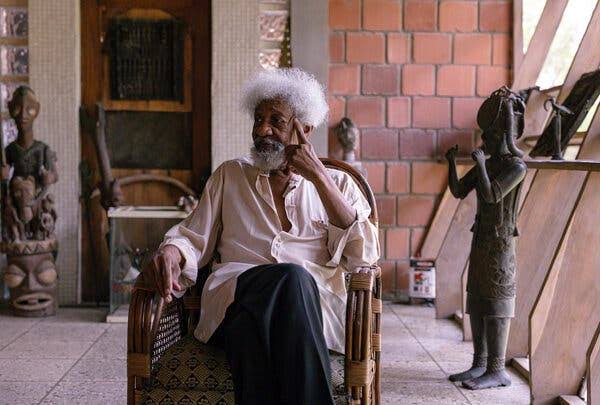Wole Soyinka, born Akinwande Oluwole Babatunde Soyinka on July 13, 1934, is a Nigerian writer known for his contributions to literature in English.
He received the Nobel Prize in Literature in 1986, being the first sub-Saharan African to receive this honor, for his insightful cultural observations and poetic expressions that shape human drama.
Early life and Education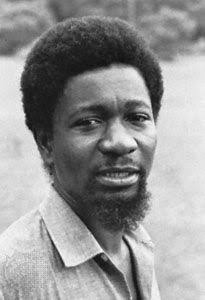
Soyinka, born into a lineage of Isara rulers, was the second child among seven siblings in Abẹokuta, Ogun State, Nigeria, during the British dominion. His father, Samuel Ayodele Soyinka, an Anglican minister and headmaster, had familial ties to the Odemo of Isara-Remo. His mother, Grace Eniola Soyinka, was a politically active Anglican, known as the “Wild Christian.” Raised in a syncretic religious environment blending Yorùbá tradition and Anglicanism, Soyinka attended church but later embraced atheism. His memoir, “Aké: The Years of Childhood” (1981), delves into his upbringing, influenced by his father’s position, providing access to electricity and radio at home.
Soyinka’s mother belonged to the influential Ransome-Kuti family, known for its prominent members such as Fela Kuti and Beko Ransome-Kuti. His educational journey began at St. Peter’s Primary School in Abeokuta, followed by Abeokuta Grammar School, where he excelled in literary composition. He later attended Government College in Ibadan, a prestigious institution, before enrolling at University College Ibadan to study English literature, Greek, and Western history. During his time there, he co-founded the Pyrates Confraternity, advocating for justice and against corruption. Moving to England in 1954, he pursued further studies at the University of Leeds under the guidance of Wilson Knight, immersing himself in the British literary scene and starting his career as a writer and editor.
Career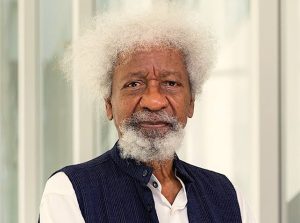
After completing his undergraduate studies with an upper second-class degree, Soyinka pursued an MA in Leeds, aiming to blend European theatrical traditions with his Yorùbá heritage. His debut play, “The Swamp Dwellers” (1958), was followed by “The Lion and the Jewel” (1959), which garnered attention from London’s Royal Court Theatre. He relocated to London, working as a play reader for the Royal Court while his works were performed in Ibadan, addressing Nigeria’s struggle between progress and tradition.
In 1957, Soyinka’s play “The Invention” premiered at the Royal Court Theatre, marking his debut there. Although primarily known for his poetry published in the magazine Black Orpheus, he received a Rockefeller Research Fellowship to explore African theatre, returning to Nigeria. Soyinka co-edited Black Orpheus and staged his satire “The Trials of Brother Jero” at University College Ibadan in April 1960. “A Dance of The Forest,” his critical portrayal of Nigeria’s political elite, won acclaim as the official play for Nigerian Independence Day in 1960, premiering in Lagos.
Soyinka formed the amateur acting ensemble “Nineteen-Sixty Masks” in the same year. He wrote the first full-length play for Nigerian television, “My Father’s Burden,” aired in August 1960. Soyinka’s works addressed the political tensions in Nigeria, leading up to a military coup and civil war. With the Rockefeller grant, he traveled extensively, critiquing Leopold Senghor’s Négritude movement and advocating for modernization. His iconic quotes, such as “A tiger doesn’t proclaim his tigritude, he pounces,” and passages from “Death and the King’s Horsemen,” reflect his philosophical depth and poetic brilliance.
In December 1962, Soyinka’s influential essay “Towards a True Theater” was published. He joined the Department of English Language at Obafemi Awolowo University in Ifẹ, engaging in discussions with “négrophiles” on current affairs and openly criticizing government censorship. His first feature-length movie, “Culture in Transition,” debuted at the end of 1963. In 1965, his novel “The Interpreters” was published, noted for its complexity and vivid documentation of Nigerian life.
That December, Soyinka co-founded the Drama Association of Nigeria, alongside scientists and theater professionals. He resigned from his university position in 1964 to protest government pressure for pro-government conduct. In 1965, he was arrested for allegedly tampering with a radio station’s broadcast, but international outcry led to his release after several months. During this period, he penned several dramatic works, including “Before the Blackout” and the comedy “Kongi’s Harvest,” and wrote “The Detainee,” a radio play for the BBC.
In 1965, “The Road” premiered in London at the Commonwealth Arts Festival, followed by promotions to headmaster and senior lecturer at the University of Lagos by the year’s end. Soyinka’s political speeches denounced personality cults and government corruption in African dictatorships. His play “Kongi’s Harvest” received acclaim at the World Festival of Negro Arts in Dakar, Senegal, in April 1966, while “The Trials of Brother Jero” and “The Lion and the Jewel” were produced in London in June 1965 and December 1966, respectively.
After assuming the role of Chair of Drama at the University of Ibadan, Soyinka intensified his political engagement. In response to the military coup in January 1966, he clandestinely met with military governor Chukwuemeka Odumegwu Ojukwu in Enugu in August 1967, attempting to prevent the Nigerian civil war, leading him to go into hiding.
During the civil war, while imprisoned for 22 months, Soyinka continued to write, despite being denied basic materials. He produced a significant body of poetry and notes critical of the Nigerian government. Despite his confinement, his play “The Lion and The Jewel” was staged in Accra, Ghana, in September 1967, and “The Trials of Brother Jero” and “The Strong Breed” premiered
In October 1969, following the end of the civil war, amnesty was declared, leading to the release of Soyinka and other political prisoners. Initially seeking solitude, Soyinka spent several months on a friend’s farm in southern France, where he wrote “The Bacchae of Euripides” (1969), a reinterpretation of the Pentheus myth. He subsequently published “Poems from Prison” in London and resumed his role as Chair of Drama at Ibadan University at the year’s end.
In 1970, Soyinka produced and adapted “Kongi’s Harvest” into a film while completing another play, “Madmen and Specialists.” With the Ibadan University Theatre Art Company, he traveled to the United States, where the play premiered at the Eugene O’Neill Memorial Theatre Center in Connecticut, providing valuable experience in theatrical production abroad.
The following year saw the publication of his poetry collection “A Shuttle in the Crypt” and the production of “Madmen and Specialists” in Ibadan. Soyinka took on the lead role as Patrice Lumumba in Conor Cruise O’Brien’s play “Murderous Angels” in Paris, addressing the Congo Crisis.
In April 1971, troubled by Nigeria’s political climate, Soyinka resigned from his university duties and entered a voluntary exile. In Paris, excerpts from his renowned play “The Dance of The Forests” were performed. In 1972, Oxford University Press published his novel “Season of Anomy,” his “Collected Plays,” and his autobiographical work “The Man Died,” consisting of notes from prison. He received an Honorary Doctorate from the University of Leeds in 1973.
During this period, he spent time on scientific studies and served as a visiting fellow at Churchill College, Cambridge University, in 1973–74. He wrote “Death and the King’s Horseman,” which had its first reading at Churchill College, and delivered lectures at various European universities.
In 1974, Oxford University Press released Soyinka’s “Collected Plays, Volume II.” The following year, he assumed the role of editor for Transition, a magazine based in Accra, Ghana, where he relocated for a period. Through his columns in Transition, he criticized “negrophiles” and military regimes, speaking out against the dictatorship of Idi Amin in Uganda. Upon the political changes in Nigeria in 1975, Soyinka returned home and resumed his position as Chair of Comparative Literature at the University of Ife.
In 1976, Soyinka published “Ogun Abibiman,” a collection of poetry, and “Myth, Literature and the African World,” a collection of essays exploring mysticism in African theatre and comparing cultures. He delivered guest lectures at the University of Ghana in Legon and saw performances of his works in Dakar and Ife.
The following year, his adaptation of Bertolt Brecht’s “The Threepenny Opera,” titled “Opera Wọnyọsi,” premiered in Ibadan. In 1979, Soyinka directed and acted in “The Biko Inquest,” based on the life of South African activist Steve Biko. His autobiographical work, “Aké: The Years of Childhood,” was published in 1981, earning him the Anisfield-Wolf Book Award in 1983.
Soyinka founded the Guerrilla Unit, a theatrical group focused on addressing community issues through dramatic sketches. His play “Requiem for a Futurologist” premiered in 1983, and the Unlimited Liability Company released a record titled “I Love My Country,” featuring songs composed by Soyinka. In 1984, he directed the film “Blues for a Prodigal” and saw the production of his play “A Play of Giants.”
During 1975–1984, Soyinka became more politically active, critiquing government corruption under President Shehu Shagari and clashing with the military regime led by Muhammadu Buhari. In 1984, a Nigerian court banned his book “The Man Died: Prison Notes,” and in 1985, his play “Requiem for a Futurologist” was published in London.
Soyinka’s groundbreaking achievement came in 1986 when he was awarded the Nobel Prize for Literature, becoming the first African laureate. Recognized for his profound cultural insights and poetic expressions, Soyinka used his Nobel acceptance speech, “This Past Must Address Its Present,” to advocate for South African freedom fighter Nelson Mandela and condemn apartheid.
In 1988, he published “Mandela’s Earth, and Other Poems” and “Art, Dialogue and Outrage: Essays on Literature and Culture” in Nigeria. He also accepted a professorship at Cornell University. His third novel, “Ìsarà: A Voyage Around Essay,” was inspired by his father’s intellectual circle. In 1991, his radio play “A Scourge of Hyacinths” aired on the BBC African Service, followed by the premiere of his play “From Zia with Love” in Siena, Italy, in 1992, both sharply critical political parodies.
Despite international acclaim, Soyinka faced persecution in Nigeria, leading to his flight from the country in November 1994. He published “The Open Sore of a Continent: A Personal Narrative of the Nigerian Crisis” in 1996 and was charged with treason by the government of General Sani Abacha in 1997. Soyinka became the president of the International Parliament of Writers from 1997 to 2000, supporting persecuted writers.
In 1999, Soyinka released “Outsiders,” a new volume of poems, and a BBC-commissioned play titled “Document of Identity,” telling the story of his daughter’s family fleeing Nigeria and encountering difficulties in Britain.
In 2001, Soyinka premiered his play “King Baabu” in Lagos, a sharp political satire on African dictatorship. The following year, his collection of poems, “Samarkand and Other Markets I Have Known,” was published by Methuen. In April 2006, he released his memoir “You Must Set Forth at Dawn” through Random House. Soyinka made headlines in 2006 by canceling his keynote speech for the annual S.E.A. Write Awards Ceremony in Bangkok to protest Thailand’s military coup.
In April 2007, Soyinka called for the cancellation of Nigeria’s presidential elections due to widespread fraud and violence. He also criticized the British government’s social policies, particularly regarding religious proselytization, in the wake of a terrorist attempt by a Nigerian student radicalized in Britain.
In August 2014, Soyinka delivered a speech titled “From Chibok with Love” at the World Humanist Congress in Oxford, receiving the 2014 International Humanist Award. He served as scholar-in-residence at NYU’s Institute of African American Affairs. Soyinka has been vocal in opposing the grazing of Fulani herdsmen in southern Nigeria, advocating for their designation as terrorists to restrict their movements.
In December 2020, Soyinka described the year as one of the most challenging in Nigeria’s history, citing not only the COVID-19 pandemic but also natural disasters and social unrest. He expressed concern about the nation’s ability to weather such crises.
In September 2021, Soyinka released “Chronicles from the Land of the Happiest People on Earth,” marking his return to novel writing after nearly 50 years. The novel, hailed by the Financial Times as a “brutally satirical look at power and corruption in Nigeria,” follows a whodunnit narrative involving three university friends. The Guardian’s review by Ben Okri praised it as Soyinka’s greatest novel, offering a scathing critique of Nigeria’s ruling class and providing a shocking portrayal of the nation in the 21st century.
Additionally, a film adaptation of Soyinka’s 1975 stage play “Death and the King’s Horseman,” titled “Elesin Oba, The King’s Horseman,” was premiered at the Toronto International Film Festival (TIFF) in September 2022. Co-produced by Netflix and Ebonylife TV and directed by Biyi Bandele, it marks Soyinka’s first work to be adapted into a feature film and the first Yoruba-language film to debut at TIFF.
Personal life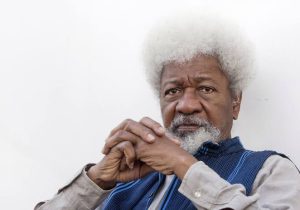
Soyinka’s personal life reflects his diverse experiences and relationships. He has been married three times and has eight children from his marriages, along with two other daughters. His first marriage was to British writer Barbara Dixon in 1958, with whom he had a son, Olaokun, and a daughter, Morenike. His second marriage, in 1963, was to Nigerian librarian Olaide Idowu, resulting in three daughters – Moremi, Iyetade (1965–2013), and Peyibomi – and a son, Ilemakin. In 1989, Soyinka married Folake Doherty, with whom he has three sons: Tunlewa, Bojode, and Eniara.
In 2014, Soyinka revealed his battle with prostate cancer, showing his openness about health challenges. He has also emphasized the importance of friendship, citing close relationships with figures like Toni Morrison and Henry Louis Gates Jr. According to Soyinka, friendship plays a vital role in preserving one’s sanity.
In November 2022, during a public presentation of his collection of essays, Soyinka expressed his perspective on religion, stating that he has never felt the need for one and identifies as a mythologist. He views deities as creatively real and considers them companions in both the real and imaginative worlds.
However, around July 2023, Soyinka faced criticism after writing an open letter to the Emir of Ilorin regarding the cancellation of the Isese festival proposed by an Osun priestess, Omolara Olatunji, also known as Yeye Ajesikemi. This action sparked controversy and garnered negative attention directed towards Soyinka.
Legacy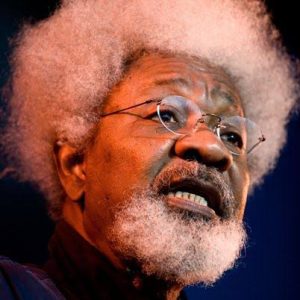
Wole Soyinka’s legacy is multifaceted and enduring, spanning literature, activism, and cultural discourse. As the first African laureate of the Nobel Prize for Literature, his literary contributions have left an indelible mark on the global literary landscape. His plays, novels, poems, and essays tackle themes of power, corruption, identity, and colonialism, showcasing his sharp wit, incisive social commentary, and deep engagement with Nigerian and African culture.
Beyond his literary achievements, Soyinka’s activism and outspokenness on social and political issues have cemented his legacy as a voice for justice and human rights. From his opposition to military regimes in Nigeria to his criticism of religious fundamentalism and cultural intolerance, Soyinka’s advocacy for freedom, democracy, and the rule of law has inspired generations of activists and intellectuals both within and outside Africa.
Soyinka’s personal courage and resilience in the face of persecution, including imprisonment and exile, serve as a testament to his unwavering commitment to his principles. His willingness to challenge authority and speak truth to power underscores his status as a moral compass and a symbol of resistance against oppression.
Moreover, Soyinka’s influence extends beyond literature and activism. His teachings as a professor, mentorship of young writers, and collaborations with artists and intellectuals have nurtured a new generation of voices and enriched the cultural landscape of Nigeria and the world.
In essence, Wole Soyinka’s legacy is characterized by his unwavering commitment to truth, justice, and artistic excellence, making him not only a towering figure in African literature but also a global icon of intellectual courage and moral integrity.
Net Worth
Estimated to be 10 million dollars


